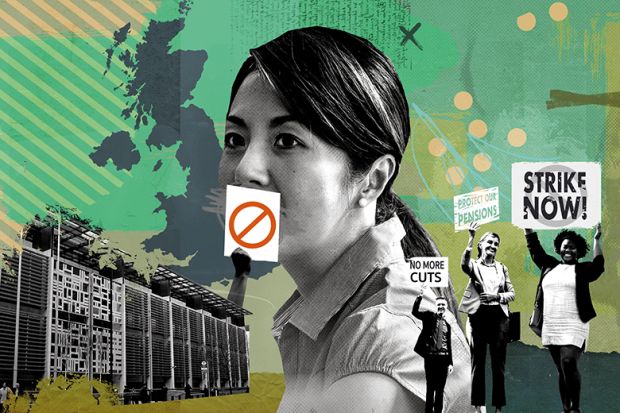The recent spate of industrial action over pensions in the UK higher education sector was extraordinary. The strike was the largest ever, running for 14 days over four weeks across 65 universities, and it received an unprecedented level of support and coverage.
As a member of the University and College Union and as a young lecturer who was set to lose more than £10,000 a year under the suspended proposals to turn the Universities Superannuation Scheme into a defined contribution system, I wanted to be a part of it. But as someone who is not a UK or European Union national and who happens to be on a Tier 2 visa for skilled workers, for me, the possibility of participating in strike action turned out to be illusory.
The Home Office requires employers sponsoring migrants on Tier 2 (and Tier 5) visas to report any unauthorised absences from work of more than 10 consecutive days. Before the commencement of the industrial action in February, the department confirmed that unauthorised absences included those resulting from strike action, and that industrial action of more than 10 consecutive days, or absence from 10 or more “expected contacts” without permission, must be reported to the Home Office. While fewer than 10 days of industrial action need not be reported, any days of action could be detrimental because they contribute towards the permissible total of four weeks of absence without pay, which, if exceeded, triggers termination of visa sponsorship.
The implication of the guidance seemed clear: academics on Tier 2 visas can strike, for a limited period based on their individual circumstances, at their own peril.
All this would not have seemed too ominous had it not been for the Home Office’s punitive disposition towards academics in recent years. The threat of deportation has been very real. Absences from the UK, even for work, have been seen as a break in continuous employment, which affects visa status and the likelihood of applications for indefinite leave to remain being granted.
Banning absences from work for participating in lawfully organised industrial action in the UK marks a further, disturbing step in the Home Office’s clampdown on immigration rights, since the rules now seem to creep into freedoms enjoyed within the UK. They run counter to Article 11 of the European Convention on Human Rights, which sets out every person’s “right to form and to join trade unions for the protection of his interests”, as well as to Article 28 of the EU Charter of Fundamental Rights, which stipulates the right of individuals to “take collective action to defend their interests, including strike action”.
It also strikes hard at individuals’ sense of belonging. Make no mistake: the denial of an equal right to strike is not merely important because it may affect my visa status or any eventual application for indefinite leave to remain. The denial is more fundamental. During the strike, I felt robbed of equal academic citizenship: of the opportunity to engage with my peers beyond teaching and research, on picket lines and in collective bargaining, building trust and solidarity on issues affecting us all. After all, the strike was about far more than just resisting pension cuts. It represented an opportunity, with my colleagues and students, to resist the marketisation of higher education and the casualisation of academic labour.
If universities can get around the right to strike – which is already highly limited in the UK – by employing those who cannot exercise it, that diminishes the value and success of industrial action, as well as democratic engagement in higher education and beyond.
The strike action has now been suspended, with the UCU accepting the deal offered by the UUK to reconsider the proposed cuts. But the issue over Tier 2 workers’ right to strike lingers. Earlier this month, the shadow chancellor, John McDonnell, joined the UCU in calling on the Home Office to clarify the right of academics and others on Tier 2 visas to exercise their right to strike without fear of reprisal.
With a new home secretary in place following the scandal over the department’s treatment of the “Windrush generation” of migrants, who have lived in the UK for many decades, the time is ripe for a review of the Home Office’s fast-changing and discretionary rules affecting hard-won labour rights.
If academics and university staff perform equal work of equal value for equal pay, there is no reason why our ability to participate in democratic processes, including strike action, should be unequal, regardless of our immigration status or national origin. Everyone should have an equal right to strike as a worker.
Shreya Atrey is a lecturer in law at the University of Bristol Law School.
POSTSCRIPT:
Print headline: Scholars with no right to strike lose their academic citizenship
Register to continue
Why register?
- Registration is free and only takes a moment
- Once registered, you can read 3 articles a month
- Sign up for our newsletter
Subscribe
Or subscribe for unlimited access to:
- Unlimited access to news, views, insights & reviews
- Digital editions
- Digital access to THE’s university and college rankings analysis
Already registered or a current subscriber?










